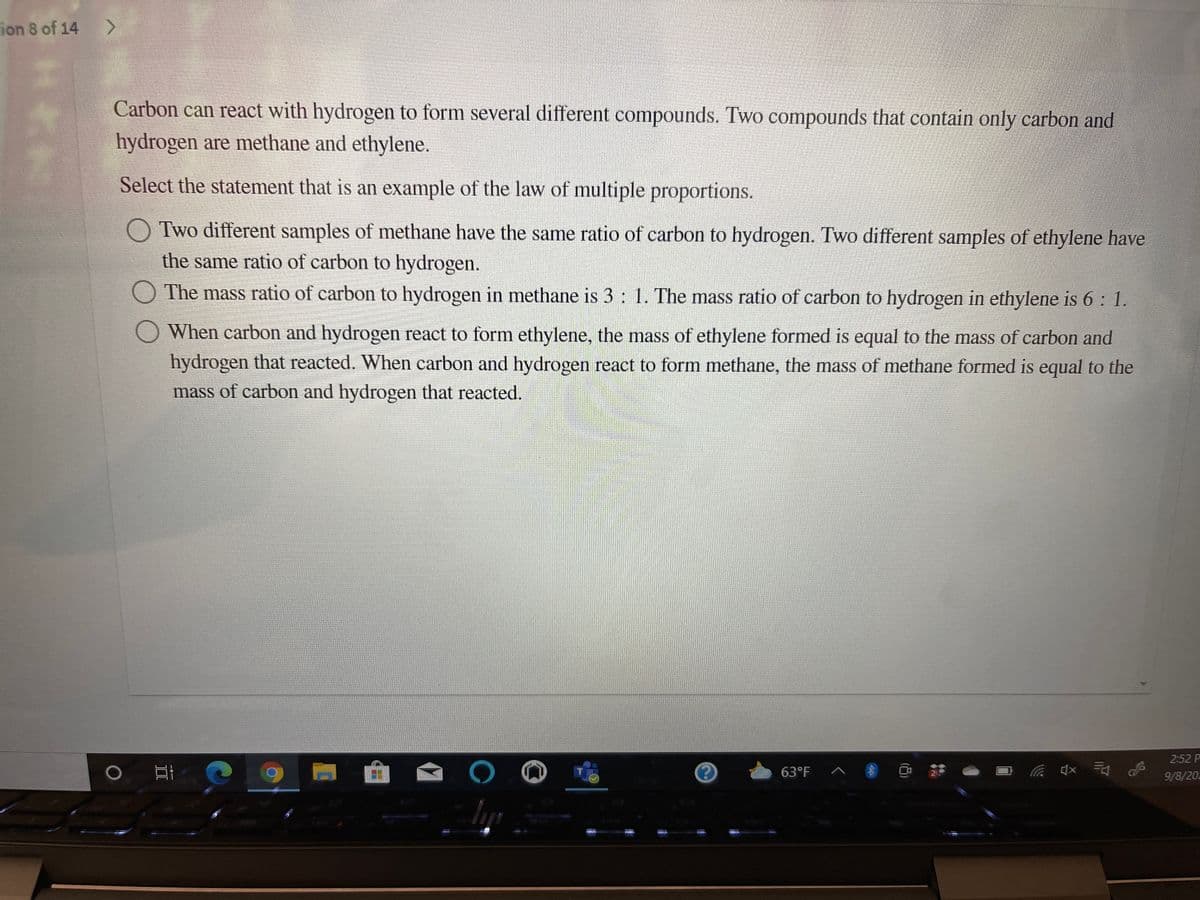Carbon can react with hydrogen to form several different compounds. Two compounds that contain only carbon and hydrogen are methane and ethylene. Select the statement that is an example of the law of multiple proportions. Two different samples of methane have the same ratio of carbon to hydrogen. Two different samples of ethylene have the same ratio of carbon to hydrogen. The mass ratio of carbon to hydrogen in methane is 3: 1. The mass ratio of carbon to hydrogen in ethylene is 6: 1. When carbon and hydrogen react to form ethylene, the mass of ethylene formed is equal to the mass of carbon and hydrogen that reacted. When carbon and hydrogen react to form methane, the mass of methane formed is equal to the mass of carbon and hydrogen that reacted.
Carbon can react with hydrogen to form several different compounds. Two compounds that contain only carbon and hydrogen are methane and ethylene. Select the statement that is an example of the law of multiple proportions. Two different samples of methane have the same ratio of carbon to hydrogen. Two different samples of ethylene have the same ratio of carbon to hydrogen. The mass ratio of carbon to hydrogen in methane is 3: 1. The mass ratio of carbon to hydrogen in ethylene is 6: 1. When carbon and hydrogen react to form ethylene, the mass of ethylene formed is equal to the mass of carbon and hydrogen that reacted. When carbon and hydrogen react to form methane, the mass of methane formed is equal to the mass of carbon and hydrogen that reacted.
Chapter1: Molecular Reasons
Section: Chapter Questions
Problem 1.4YT: Constant Composition of Compounds Two samples of sugar are decomposed into their constituent...
Related questions
Question

Transcribed Image Text:ion 8 of 14 >
Carbon can react with hydrogen to form several different compounds. Two compounds that contain only carbon and
hydrogen are methane and ethylene.
Select the statement that is an example of the law of multiple proportions.
O Two different samples of methane have the same ratio of carbon to hydrogen. Two different samples of ethylene have
the same ratio of carbon to hydrogen.
O The mass ratio of carbon to hydrogen in methane is 3 : 1. The mass ratio of carbon to hydrogen in ethylene is 6 : 1.
O When carbon and hydrogen react to form ethylene, the mass of ethylene formed is equal to the mass of carbon and
hydrogen that reacted. When carbon and hydrogen react to form methane, the mass of methane formed is equal to the
mass of carbon and hydrogen that reacted.
2:52 P
63°F A @ *
, ×p ジ ロ
9/8/20
Expert Solution
This question has been solved!
Explore an expertly crafted, step-by-step solution for a thorough understanding of key concepts.
This is a popular solution!
Trending now
This is a popular solution!
Step by step
Solved in 2 steps

Knowledge Booster
Learn more about
Need a deep-dive on the concept behind this application? Look no further. Learn more about this topic, chemistry and related others by exploring similar questions and additional content below.Recommended textbooks for you


Chemistry: Principles and Reactions
Chemistry
ISBN:
9781305079373
Author:
William L. Masterton, Cecile N. Hurley
Publisher:
Cengage Learning

Introductory Chemistry: An Active Learning Approa…
Chemistry
ISBN:
9781305079250
Author:
Mark S. Cracolice, Ed Peters
Publisher:
Cengage Learning


Chemistry: Principles and Reactions
Chemistry
ISBN:
9781305079373
Author:
William L. Masterton, Cecile N. Hurley
Publisher:
Cengage Learning

Introductory Chemistry: An Active Learning Approa…
Chemistry
ISBN:
9781305079250
Author:
Mark S. Cracolice, Ed Peters
Publisher:
Cengage Learning

Chemistry by OpenStax (2015-05-04)
Chemistry
ISBN:
9781938168390
Author:
Klaus Theopold, Richard H Langley, Paul Flowers, William R. Robinson, Mark Blaser
Publisher:
OpenStax

Living By Chemistry: First Edition Textbook
Chemistry
ISBN:
9781559539418
Author:
Angelica Stacy
Publisher:
MAC HIGHER

Chemistry
Chemistry
ISBN:
9781305957404
Author:
Steven S. Zumdahl, Susan A. Zumdahl, Donald J. DeCoste
Publisher:
Cengage Learning